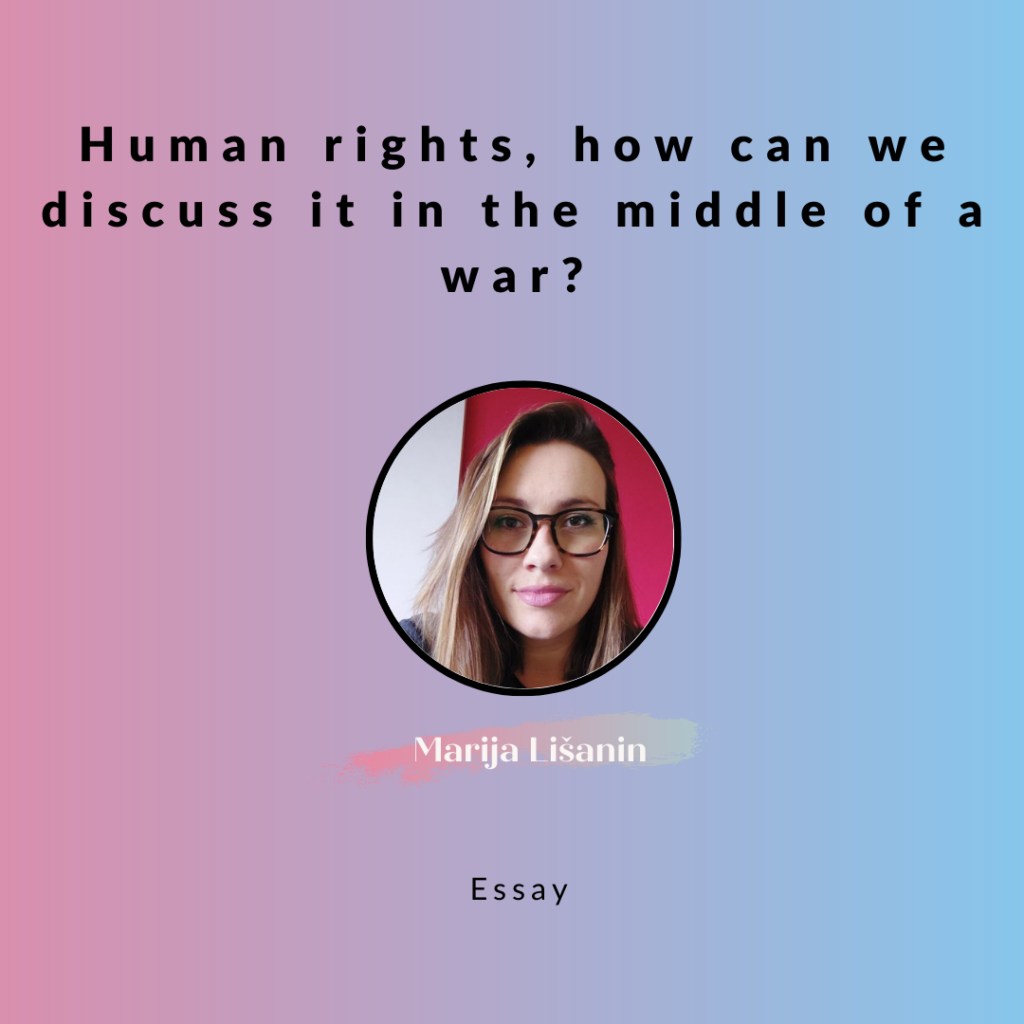
December is the month when we highlight the importance of human rights. But how can we talk about them if we found ourselves stuck in the middle of a war or running away from it?
They say history repeats itself. What can we learn and what should we do? How to survive a war and stay alive? Where do we address problems and who cares about human rights when there is a war?
Back then when I was an eight years old girl, my human rights, as a child, were invisible. Why so? The war started in Yugoslavia in 1999. The schools were closed, we were hiding in case of falling bombs. I was confused. I still have tension in my stomach as a trauma response when I hear alerts for the potential attack. Whenever I hear about the war in another country I feel psychologically triggered, feeling angry, and sad at the same time. I remember then, as a child, that my father was never at home because he was one of the heroes. A fireman, at the front, putting the fire down.
What does war destroy? Our human rights. It means no right to education, no right to play freely with friends, to go out when it is dangerous outside, and so on.
Human rights, an ancient seed
Later on, I was volunteering and learning about human rights. What are our human rights?
The first idea of human rights is very old. Even in ancient times, Greek philosophers (sophists) pointed out that the natural right of people is stronger than existing laws and the people should not accept an order that morally humiliates them.
At the beginning of the 13th century, king John of England was forced to accept the Great Charter of Freedoms (lat. Magna Carta Libertatum) and to put a royal seal on it.
Fast forward to the modern world, Thomas Jefferson wrote The Declaration of Independence (1776) in Philadelphia at the Declaration house. It quickly became one of the nation’s most cherished symbols of liberty and Jefferson’s most enduring legacy. In exalted and unforgettable phrases, Jefferson expressed the convictions in the minds and hearts of the American people. “We hold these truths to be self-evident, that all men are created equal, that they are endowed by their Creator with certain unalienable Rights, that among these are Life, Liberty and the pursuit of Happiness.”
Social development during the 19th century in the area of freedoms and human rights is characterized by two facts: the introduction of the Declaration of Human Rights in the constitutional documents of the countries and a persistent struggle to expand these rights.
Another meaningful declaration is the French Declaration of the Rights of Man and the Citizen (fr. Declaration des Droits de L’Homme et du Citoyen) is one of the basic charters of human liberties, containing the principles that inspired the French Revolution. It was adopted in 1789. The basic principle of the Declaration was that all “men are born and remain free and equal in rights” (Article 1), which were specified as the rights of liberty, private property, the inviolability of the person, and resistance to oppression (Article 2). All citizens were equal before the law and had the right to participate in legislation directly or indirectly (Article 6) and no one was to be arrested without a judicial order (Article 7). Freedom of religion (Article 10) and freedom of speech (Article 11) were safeguarded within the bounds of public “order” and “law.” The document reflects the interests of the elites who wrote it: property was given the status of an inviolable right, which could be taken by the state only if an indemnity was given (Article 17); offices and positions were opened to all citizens (Article 6).
Human rights in modern times, a necessary prerequisite
In the twentieth century, and especially after the first and second world wars, the list of rights of man and citizen was expanded with new rights such as the right to work, the right to participate in the management of enterprises, and other socio-economic rights. This is where the German constitution sits (1919), as well as Austria’s (1920), Spain’s (1931. i 1978.), France (1946. and 1958.), Italy (1948), and the Federal Republic of Germany (1949.) In all of these constitutions, it was added basic freedoms and rights, the basic duties and obligations of citizens such as serving in the army, paying taxes, conscientiously performing public functions, and respect to the constitution and law.
Several important documents on human rights have been adopted within the international community. One of them is the Universal Declaration of the Rights of Man (1948.) In particular, the Universal declaration emphasizes the right to life, the right to liberty and security of persons, freedom from slavery, torture, cruel and humiliating treatment and punishment, the right to personality, the right to a fair trial, the right to privacy, the right to freedom of movement, etc.
The Council of Europe, as a regional organization, is important for its priority goals (Statute, 1949) – the protection and promotion of human rights, and the condition for admission is respect for human rights.
Every war is destructive for civilians. Today we have a war in Ukraine, and many civilians are the principal victims. It is an ongoing war, and only strong solidarity can help civilians to find a way out and live in an environment where they can have guaranteed human rights and freedoms. We should keep promoting human rights and educate others on how to be helpful to those who suffer.
by Marija Lišanin
Resources
Magna Carta | Definition, History, Summary, Dates, Rights, Significance, & Facts | Britannica
The Declaration of Independence | The Constitutional Walking Tour of Philadelphia
Declaration of the Rights of Man and of the Citizen | Summary | Britannica
Universal Declaration of Human Rights | United Nations
Human rights defenders – Commissioner for Human Rights (coe.int)
Invasion of Ukraine is an act of aggression and human rights catastrophe (amnesty.org)



